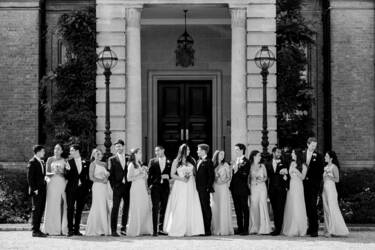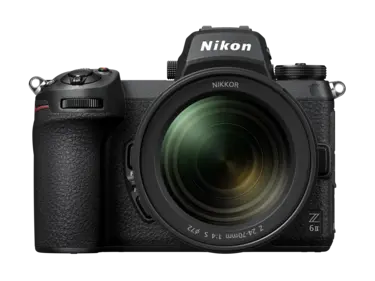How to elevate your group portraiture for better family and wedding photographs

Group portraiture a bit lacklustre? Award-winning wedding photographer Paul Santos walks us through his top tips, from how to take control to lowering your shutter speed
Group portraiture can often feel like a functional ‘going through the motions’ set of images during a wedding, but it is these photographs that often end up perched proudly on our mantelpieces.
“These photographs are valuable and become more valuable in time,” explains award-winning wedding photographer Paul Santos. “During the wedding, those important people won’t be standing together in a pleasing format by coincidence. As a photographer, I need to make these photos happen, and take control of how it happens, and where it happens.”
Having started in the wedding business more than 15 years ago (after a small stint in corporate photography), Paul set out to go against the old-school traditions of wedding photography (think dated posed, too formal, often lacking emotion) and embrace editorial chic, using light, colour, emotion, movement and motion blur to compose timeless photographs.
Named as a Rising Star in the International Stars of Wedding Photography (WPPI), two times award-winner of Junebug’s Top 50 Wedding Photographers in the World, not to mention recipient of numerous winning images in the International Wedding Photographer of the Year awards, Paul’s accolades are sky high and his Nikon camera – first the D90 now the Z6II – has been with him the entire time. So, what does he have to say about group portraiture?

What’s in my kitbag?

Z6II + NIKKOR Z 85mm f/1.8 S, 1/6400 sec, f/3.5, ISO 100 ©Paul Santos Weddings
Set the guidelines
Build a rapport and connection with your bride and groom. Before a wedding, understand what’s important to each couple. “This gives me the approach I need on the day, together with a concise list of images required,” Paul explains. “I’m all set to walk into a wedding with confidence.”
Grab an 85mm lens
Inside Paul’s kitbag – a stylish Ted Baker leather bag with custom-made protective partitions – are two Nikon Z6IIs, the NIKKOR Z 85mm f/1.8 S, NIKKOR Z 35mm f/1.8 S, NIKKOR Z 28-75mm f/2.8 and a Speedlight SB-500.
His go-to lens for group portraiture? The NIKKOR Z 85mm f/1.8 S. “With an 85mm, you can distance your subjects from the background and your camera, creating wonderful focus and bokeh. Within group portraits, people take up a large part of the frame, which is even easier with the 85mm.”
When it’s time for group shots, pull your wedding party away from the rest of the guests and find a calm, quiet and airy environment, Paul advises.


Use AF-S (people) recognition and Wide-area AF (people)
As no one is moving, select AF single point to fix the camera on a point selected by you. “I love using Auto-area AF (People) for group portraiture,” Paul says. “For a large party, wide-area AF (People) restricts focusing to the moveable box you select. This was excellent when I was photographing a group portrait in front of a set of paintings and the camera also wanted to focus on the eyes of the paintings.”
Top tip: Use Wide-area AF (people) for confetti photographs to lock in on the couple’s faces rather than their surrounding guests.


Thirty minutes max on group portraiture
After 30 minutes of group portraiture, genuine smiles and patience start to fade.“My terrible sense of humour can only keep people entertained for so long!” Paul laughs. “Thirty minutes is eight to ten formal photographs, but ten photos provide every combination you can think of. For consistency and speed, once you start at a spot, that’s where all the photos will usually be taken,” Paul explains. “I don’t want to take the couple away from their guests for too long, so the quickest set-up that offers the best outcome is ideal. Always know who the most important people are and always have a paper outlying all the shots the couple want.”

D750 + AF-S NIKKOR 24-70mm f/2.8E ED VR, 24mm, 1/200 sec, f/2.8, ISO 100 ©Paul Santos Weddings
Take control
“Talk and interact with everyone in front of you, put them at ease, offer compliments, help parents stand well, give awkward dangling arms purpose (pop a man’s hand in his pocket for example), tell terrible jokes and have guests laugh with you and sometimes at you. This is how you build trust and connection. The placement, light, composition and mood all create that one photo that shines. And then on to the next.”

Z6II + NIKKOR Z 85mm f/1.8 S, 1/200 sec, f/5, ISO 1000 ©Paul Santos Weddings
If in doubt, use a chair
Sometimes more compositional structure is needed, and this is where a chair can come in. “In the photograph below my appeal for symmetry is satisfied with the three bridesmaids on either side. Here, the two chairs provide balance and a little more structure to the image.” It’s a case of making the decision on the day as sometimes if the group is animated enough (as in in the landscape image above) there’s no need to change things.


Use a wide angle for all party photographs
The best time for an all-party photograph is when everyone is together just before sitting down for dinner. Use a wide angle, instruct everyone to look over to you and, if you can shoot from overhead, even better.
Set your shutter speed low to emphasise movement
Portraits don’t need to be static. Snap your couple or group with an intentional low shutter speed to show movement, especially if the wedding dress is moving advises Paul. “Close your aperture down to anything from f/10 to f/20 to diminish the light and then set your shutter speed to around 1/20 sec to bring the light back in. That’s how you get a photo containing movement and joy. Without joy or a point to the photo, it’s just a blurry photograph. Adding movement evokes more mood and more feeling.”


Experiment with motion blur and flash at night
Motion blur is perfect for an image where there is already movement and you want to recognise that movement and then elevate it. “I love using motion blur when the couple walks down the aisle post ceremony or where the dress flows behind or with unexpected group hugs,” Paul says.
Motion blur on the dancefloor can add to the party atmosphere. “If you’ve got a lively crowd and it’s a darker environment, I will use a slow shutter speed of 1/10 sec, ISO 800-1000 and f/10,” says Paul. “I’ll set my flash either on manual or on TTL flash metering mode. The flash freezes the subject while the 1/10 sec shutter speed allows light trails and blur while your subjects remain in focus.”

Z6II + NIKKOR Z 28-75mm f/2.8 S, 28mm, 1/10 sec, f/13, ISO 1000 + Flash ©Paul Santos Weddings
Use monochrome for added emotion
A black and white photograph either contains strong emotion or strong contrast in light. “If it’s emotional, the lack of colour allows that emotional hit to be understood and felt quicker within your brain without the added colour information processing,” Paul explains. “If it’s contrast and light, then I use the light to only show what I want to be seen or place a much stronger focus on a particular subject. In the image below, Eleanor stands in a dark 12th-century priory with just the side door light illuminating her, emphasising her dress.”



Z6II + NIKKOR Z 28-75mm f/2. 8, 30mm, 1/1250 sec, f/2.8, ISO 100 ©Paul Santos Weddings
Paul Santos’ tips for better wedding photography
Aim for thoughtful composition, good light and the sincere capture of authentic emotion and moments. The most important factors for great wedding photographs are the same things that have always kept the best photographs valuable above all others.
Preserve a couple’s legacy. Take meaningful and timeless heirloom photos that will endure beyond passing trends and show future generations an authentic insight into a very special and important day.
Be present in the moment. The best photos happen when you’re fully aware of what’s happening around you and in front of you.
Be confident in your equipment and have a clear idea of what you want in the image. I tend to do very little in post-production – colour correction, a little crop or straightening – but, overall, I like to get the image right in camera. My equipment and settings give me the confidence for this happen, which in turn keeps the time I spend editing after to a minimum.
Join the Nikon Professional Service. The scheme offers loads of benefits, from professional camera support to priority repairs. Recently in Edinburgh I was able to try out the Nikon Z8 and Z9 – so difficult to decide which one to upgrade to. And now there’s the new Nikon Z6III!
More in Weddings
Featured products
Uncover NIKKOR lenses

Unlock greater creativity











